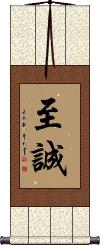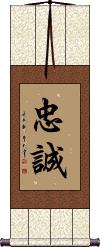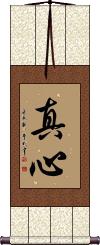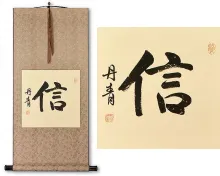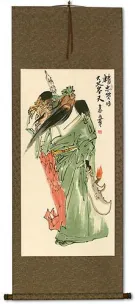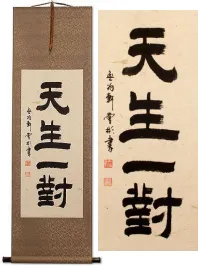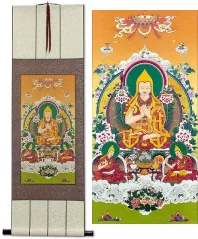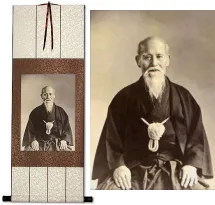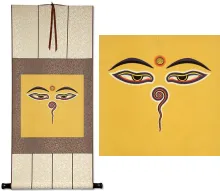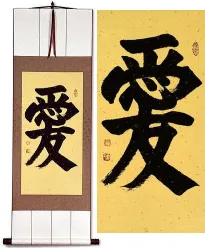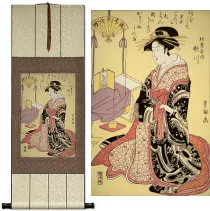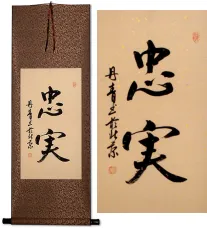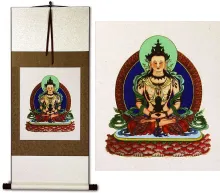Many custom options...
And formats...

Sincerity and Devotion in Chinese / Japanese...
Buy a Sincerity and Devotion calligraphy wall scroll here!
Personalize your custom “Sincerity and Devotion” project by clicking the button next to your favorite “Sincerity and Devotion” title below...
Sincerity and Devotion
至誠 is the idea that you enter into something with the utmost sincerity and fidelity. Ideas such as devotion, honesty, and “one's true heart” are also contained in this word.
至誠 is a universal word as the Chinese, Japanese Kanji, and Korean Hanja are all identical.
Loyalty
忠誠 is the written form of loyalty that is universal in Chinese, Japanese Kanji, and old Korean Hanja.
Loyalty is staying true to someone. It is standing up for something you believe in without wavering. It is being faithful to your family, country, school, friends, or ideals when the going gets tough and when things are good. With loyalty, you build relationships that last forever.
Notes:
1. There is also a Japanese version that is part of the Bushido Code which may be more desirable depending on whether your intended audience is Japanese or Chinese.
2. This version of loyalty is sometimes translated as devotion, sincerity, fidelity, or allegiance.
True Heart
While 真心 literally reads as “true heart” or “genuine heart,” the understood meaning is sincerity, devotion, sincere, or heartfelt. Some will extend the meaning to be like “true love.” It's the idea of doing something or treating someone with genuine feelings.
真心 is valid and has the same meaning in both Chinese characters and Japanese Kanji.
Note: While not too common, this can be the female given name “Mami” in Japanese.
This in-stock artwork might be what you are looking for, and ships right away...
Gallery Price: $65.00
Your Price: $39.88
Gallery Price: $200.00
Your Price: $88.88
Gallery Price: $101.00
Your Price: $55.88
Gallery Price: $63.00
Your Price: $34.88
Gallery Price: $63.00
Your Price: $34.88
Gallery Price: $200.00
Your Price: $90.88
Gallery Price: $100.00
Your Price: $49.88
Gallery Price: $140.00
Your Price: $89.77
Gallery Price: $108.00
Your Price: $59.88
Gallery Price: $52.00
Your Price: $28.88
Not the results for sincerity and devotion that you were looking for?
Below are some entries from our dictionary that may match your sincerity and devotion search...
| Characters If shown, 2nd row is Simp. Chinese |
Pronunciation Romanization |
Simple Dictionary Definition |
信 see styles |
xìn xin4 hsin yuki ゆき |
More info & calligraphy: Honesty / Fidelity(1) honesty; sincerity; fidelity; (2) trust; reliance; confidence; (3) (religious) faith; devotion; (counter) (4) counter for received messages; (female given name) Yuki śraddhā. Faith; to believe; belief; faith regarded as the faculty of the mind which sees, appropriates, and trusts the things of religion; it joyfully trusts in the Buddha, in the pure virtue of the triratna and earthly and transcendental goodness; it is the cause of the pure life, and the solvent of doubt. Two forms are mentioned: (1) adhimukti, intuition, tr. by self-assured enlightenment. (2) śraddhā, faith through hearing or being taught. For the Awakening of Faith, Śraddhotpāda, v. 起信論. |
真心 see styles |
zhēn xīn zhen1 xin1 chen hsin mami まみ |
More info & calligraphy: True Heart(noun - becomes adjective with の) sincerity; true heart; devotion; (female given name) Mami |
至誠 至诚 see styles |
zhì chéng zhi4 cheng2 chih ch`eng chih cheng yoshimasa よしまさ |
More info & calligraphy: Sincerity and Devotionsincerity; devotion; (given name) Yoshimasa penetrated |
十德 see styles |
shí dé shi2 de2 shih te jittoku |
The ten virtues, powers, or qualities, of which there are several groups, e.g. in the 華嚴經,十地品 there are 法師十德 the ten virtues of a teacher of the Law, i.e. he should be well versed in its meaning; able widely to publish it; not be nervous before an audience; be untiring in argument; adaptable; orderly so that his teaching can be easily followed; serious and dignified; bold and zealous; unwearied; and enduring (able to bear insult, etc.). The 弟子十德 ten virtues or qualities of a disciple according to the 大日經疏 4, are faith; sincerity; devotion to the trikāya; (seeking the) adornment of true wisdom; perseverance; moral purity; patience (or bearing shame); generosity in giving; courage; resoluteness. |
赤心 see styles |
sekishin せきしん |
(form) sincerity; true heart; devotion; (given name) Sekishin |
赤誠 赤诚 see styles |
chì chéng chi4 cheng2 ch`ih ch`eng chih cheng sekisei / sekise せきせい |
utterly sincere; wholly devoted (form) sincerity; true heart; devotion |
肝膽相照 肝胆相照 see styles |
gān dǎn xiāng zhào gan1 dan3 xiang1 zhao4 kan tan hsiang chao |
to treat one another with absolute sincerity (idiom); to show total devotion |
誠心誠意 诚心诚意 see styles |
chéng xīn chéng yì cheng2 xin1 cheng2 yi4 ch`eng hsin ch`eng i cheng hsin cheng i seishinseii / seshinse せいしんせいい |
earnestly and sincerely (idiom); with all sincerity (adv,n,adj-no) (yoji) in all sincerity; with one's whole heart; whole-hearted devotion |
The following table may be helpful for those studying Chinese or Japanese...
| Title | Characters | Romaji (Romanized Japanese) | Various forms of Romanized Chinese | |
| Sincerity and Devotion | 至誠 至诚 | shisei | zhì chéng zhi4 cheng2 zhi cheng zhicheng | chih ch`eng chihcheng chih cheng |
| Loyalty | 忠誠 忠诚 | chuu sei / chuusei / chu sei | zhōng chéng zhong1 cheng2 zhong cheng zhongcheng | chung ch`eng chungcheng chung cheng |
| True Heart | 真心 | mago koro / magokoro | zhēn xīn / zhen1 xin1 / zhen xin / zhenxin | chen hsin / chenhsin |
| In some entries above you will see that characters have different versions above and below a line. In these cases, the characters above the line are Traditional Chinese, while the ones below are Simplified Chinese. | ||||
Successful Chinese Character and Japanese Kanji calligraphy searches within the last few hours...
